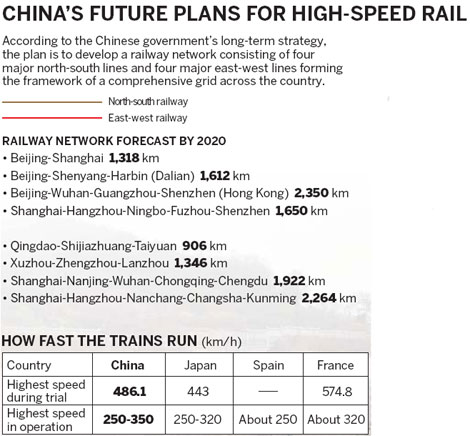Bullet trains still on the fast track
 0 Comment(s)
0 Comment(s) Print
Print E-mail China Daily, March 7, 2012
E-mail China Daily, March 7, 2012

China will launch nine new lines for bullet trains by the end of this year, indicating that the country will not change its plans for railways in the 12th Five-Year Plan (2011-15) despite a fatal bullet train crash in July, a railway official said on Monday.
Huang Qiang, chief researcher of the China Academy of Railway Sciences and a member of the Chinese People's Political Consultative Conference National Committee, added that the country will welcome overseas and private investment to overcome a lack of funding.
Some high-speed train projects were stalled last year because of a budget shortfall of 500 billion yuan ($79 billion) for the whole industry, said Huang.
On Monday, Wang Mengshu, chief engineer of the China Railway Tunnel Group, told the annual session of the National People's Congress, the top legislative body, that the suspension cost the country more than 100 billion yuan, according to reports from the Xinhua News Agency.
"According to China's plans, by the end of this year the total track length will stretch 80,000 kilometers, and will be 120,000 kilometers by the end of 2015," Huang said.
The rails for the high-speed trains - currently 7,000 km in length - will account for 12,000 km of the 2015 total.
On July 23, a high-speed train crashed into a stalled engine near the city of Wenzhou leaving 40 people dead and 172 injured. It was the first major accident in the history of China's high-speed railway.
An official report released about six months later showed that the collision was caused by severe design defects in control-center equipment and inadequate inspection of parts.
"All the defective parts have been recalled and replaced," said Li Heping, another researcher at the China Academy of Railway Sciences and also a member of the CPPCC.
Following the crash, the government reduced the speed of bullet trains to 300 km per hour from 350 km. However, Huang said the reduction wasn't implemented because of the accident, but because China's current railway situation doesn't call for such a high speed. "When we add more trains, the speed may rise again." he said.
He also admitted that exports of high-speed trains will be affected by the crash in the short term, but he is optimistic about exporting trains and technology over the long term.
"Although in some technologies, China is still behind developed countries, such as Japan and Germany, we have advanced technologies that are comparable with those of other countries," he said.


Go to Forum >>0 Comment(s)
 Add your comments...
Add your comments...
- User Name Required
- Your Comment
- Racist, abusive and off-topic comments may be removed by the moderator.





